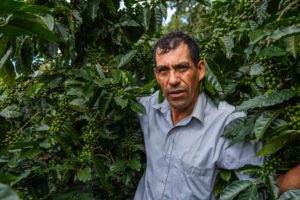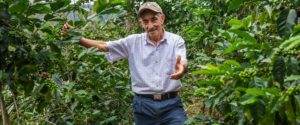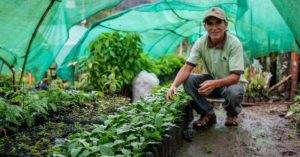A lockdown lesson: planting seeds of opportunity
Planet-friendly farming techniques and diversification can make vulnerable communities in Peru and Bolivia more resilient to future emergencies.
In times of crisis, economic structures and the responsiveness of governments and businesses are put to the test, and often found to be lacking. The ‘normal’ ways of doing things may be unable to cope with the abrupt changes a crisis brings, raising questions around how fit ‘normal’ was in the first place.
But from adversity also springs opportunity. Coronavirus has shone a light on shortcomings in the farming market systems in Latin America, giving us the chance to create a better way of doing things. It’s a way of doing things that benefits farmers, helps people adapt to the changing climate and protects the environment. It also has the potential to lessen the negative impact of future health emergencies.
Farming paralysis in Peru and Bolivia

Coffee is the mainstay of many farming businesses in Peru and Bolivia. But a reliance on one crop leaves farmers like Mateo vulnerable to market fluctuations.
The agriculture and livestock sectors in Peru and Bolivia are being badly affected by the pandemic. Farmers who grow crops deemed as ‘non-essential’, such as coffee and cocoa, have been particularly impacted. Mandatory quarantine, market restrictions and transport constraints are making it almost impossible for them to sell their produce. Much of their precious harvest is being left to rot in the fields.
Many of these smallholder coffee and cocoa growers work on isolated family farms. They generally have low levels of education and get by on a small income, even at the best of times. They often have a limited workforce and have poor access to technical help, markets and credit. Climate change has disrupted weather patterns and made extreme weather events more likely, adding an extra element of uncertainty to farmers’ lives.
Smallholder farmers are also more likely to be reliant on a single crop (monoculture), often coffee or cocoa. The pandemic means the market chains for these crops have essentially ground to a halt. We predict that this economic paralysis, combined with the poverty many smallholder farmers live in, will result in unprecedented social and economic impact.
No-one is prepared for this situation. Least of all the smallholder farmers who will be the most badly affected by it.
Grants or donations may provide a temporary solution, but if we really want to improve the lives and livelihoods of coffee farmers (and the wider industry), we need to diversify and build resilience within the sector. We need to plan beyond the state of emergency.
Beyond coronavirus
In order that farmers are less vulnerable in the future to crises like coronavirus, we have to build a different system. One that makes farmers more resilient and better prepared, as well as protecting the planet and not contributing to climate change.
While coping with the current pandemic is the most pressing issue for the governments of Peru and Bolivia right now, we ask them to not lose sight of these bigger challenges.
Adapting to climate change must be at the heart of the solution because it has environmental, social and economic consequences that mainly affect the most vulnerable populations who depend directly on the planet’s natural resources.
Farming for people and planet
In the face of climate change, we’ve been working with governments, partners and businesses to develop solutions that improve productivity and the resilience of coffee and cocoa producers. Not only that, our approaches benefit the planet too. A big part of the answer lies in diversification.
We’ve been working with coffee farmers in Peru for the last 30 years to develop planet-friendly farming techniques. In Bolivia, we work with farmers in the Amazon rainforest to identify and encourage the best way to farm cocoa.
We focus our work on three areas, which are helping us make farming work for smallholder farmers – despite the new climate reality:
1. Reforestation
By reintroducing and maintaining natural forests, farmers are helping to improve the quality of the soil and conserve the precious natural ecosystem.
2. Seed selection
Selecting diverse seeds suited to the local environment is vital – seeds can mean the difference between a vulnerable monoculture and a diverse, resilient farm.

Our training has helped Genaro replant and protect the precious forest surrounding his farm.
3. Training
We help farmers access training to improve their skills – and to become ambassadors for our work, sharing their knowledge with others. Our approach is not only increasing productivity and the quality of the harvest, it’s improving the resilience of the land itself. Farmers have a better income and are less vulnerable to climate change and any health crisis that comes their way.
This newfound resilience means that when a crisis does strike, isolated communities like those in the Amazon are better able to cope. They are more autonomous and have reserves of food and knowledge to fall back on.

Diversifying his farm to grow many different crops has helped Mario become more self-sufficient and resilient to both climate change and future crises.
Goodbye monoculture, hello diversity
In the last five years, our work in Peru and Bolivia has focused on helping farmers find different ways of making money so they’re not reliant on one crop. Diversification means farmers have something to fall back on if coffee prices, for example, are hit by fluctuations in the international market.
When farmers are encouraged to use some of their land to grow vegetables, it can be a lifeline when a crisis strikes. During the ongoing lockdown period, communities that are self-sufficient in food have been in a better position to cope as transport restrictions have made bringing in supplies from outside more difficult.
The big picture
We’ve been showing the benefits of reforestation and diversification to the national governments of Peru and Bolivia for years. We’re now hoping to influence the measures that are being taken to control the pandemic to make sure they also take into account conservation commitments and the livelihoods of those in the poorest and most isolated areas.
The big question is whether this pandemic will be the catalyst for social transformation towards environmental and economic sustainability. It’s possible. But it’s also possible that efforts to restore business as usual will generate a further increase in carbon emissions and ecosystem loss. Something that would make another, similar health crisis more likely in the near future.
Our close working relationships with decision makers in these two countries means we’re in a good position to influence the outcome. With the help of our partners and donors, we’re helping to build farming systems that work for Peru and Bolivia’s smallholder farmers and the area’s fragile ecosystem. That, in turn, will make these vulnerable communities more resilient to future health crises.
The pandemic has caused normal to fail for many smallholder farmers. Let’s take this opportunity to create change that’s anything but normal.
Our team in Latin America is focused on helping families become more resilient to climate and natural hazards and improving the effectiveness and profitability of their farming methods. This article was written by Carlos Rueda, María Claudia Valdivia and José Tirabanti in Perú and Shirley Pazos in Bolivia.